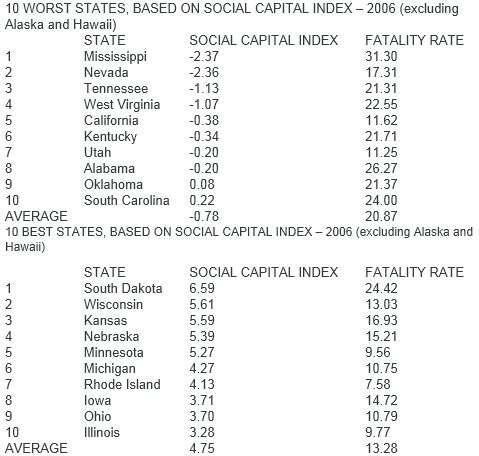Can voting, trusting others reduce traffic fatalities?
(Phys.org)—CCNY study relates social capital to crash deaths, finds more killed in states scoring low on voting, community involvement and trust.
Do you live or drive in a state where people don't vote, get involved in community organizations or trust their neighbors? If so, your chances of being fatally injured in a highway collision may be 50 percent greater, according to research by Dr. Matthew Nagler, associate professor of economics at The City College of New York.
In an article published in the Eastern Economic Journal, Professor Nagler shows how social capital plays a role in the number of fatalities occurring in collisions involving more than one vehicle or at junction points such as intersections and highway interchanges. His findings, based on 10 years of data for the 48 contiguous U.S. states, suggest that fostering pro-social behavior could improve highway safety and reduce the number of deaths.
"The fatality rate for the states with the greatest social capital is significantly lower than those with the least social capital," he said. "To be specific, the data indicate that you would have a 50 percent greater chance of dying in a traffic accident in a low-social-capital state than in a high one."
Professor Nagler theorizes that drivers in states with higher social capital tend to be more aware of and more courteous to others around them while behind the wheel.
For his study, Professor Nagler measured social capital in two different ways. State-by-state results for both measures were compared with highway fatality rates for the 10-year period 1997 – 2006. Each component was standardized to mean zero, so negative numbers represent below-average social capital while positive numbers represent above-average social capital.
First, he created a social capital index based on the sum of four measures of community involvement: election turnout, church attendance, club meeting attendance and volunteer activity. He also gauged social capital based on the trusting attitudes it creates.
To do this, he used a measure of generalized trust derived from responses to a survey question about whether "most people are honest" in the DDB Life Style Data. This is a proprietary database of DDB Worldwide, a global marketing communications firm, which he had permission to use.
The 10 states with the lowest social capital index scores had average fatality rates of 20.87 per 100,000 persons, whereas the 10 states with the highest social capital index scores had average fatality rates of 13.28 per 100,000 persons, a difference of 57.1 percent. Professor Nagler added that the "results come out pretty consistently" for both measure measures of social capital.
Several factors contribute to the disparities in social capital among the states, he noted. While social capital is greater in states where the populace is better educated, movement of individuals may play an even greater role, he said. "For instance, if people tend to commute to work locally rather than drive great distances from home to work, they are more likely to build strong ties within their community."
Other factors include culture and demographics. Low social capital levels in the deep South are likely due to the legacy of slavery and distrust between whites and blacks in this region, Professor Nagler said. On the other hand, in the Upper Midwest, where social capital is atypically high, state populations tend to be more homogenous, and people tend to trust others whom they judge to be more like them.
To factor out extraneous effects and view the impact of social capital in isolation, Professor Nagler employed a number of control variables that impact highway safety. They include: real gross state product per capita, vehicle miles traveled per capita, unpaved roads as a percent of local road mileage, percentage of the population over 65 and the state maximum speed limit.
While the study showed a statically significant trend, some outliers were found among the data. For example, South Dakota, which had the highest social capital index score, 6.59, had an above-average highway fatality rate, 24.42 per 100,000 persons. Professor Nagler said this could reflect cultural tendencies in rural states such as higher DWI rates and passengers not wearing seatbelts. Two states that scored low on social capital, California and Utah, had fatality rates significantly below national averages, 11.62 and 11.25 per 100,000 persons, respectively.
States can improve their social capital scores – and reduce fatalities – through public promotion of education, Professor Nagler said, since people with greater human capital tend to build more and stronger ties to their communities. Better driver education could play a role, too, if courses could emphasize driver empathy – that is, viewing other people on the road as being like oneself.
"We as people have a tendency to treat others as human when we encounter them on foot, but when someone is encased in their car there is a tendency not to see the person inside and, therefore, to behave less courteously."
He also noted that programs that promote home ownership encourage people to become more engaged with their communities.

Provided by The City University of New York















